The UN Forum on Sustainable Development Goals – “A high sense of urgency is the strongest motivation we have.”
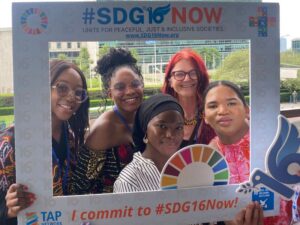
“Unless we act now, the 2030 Agenda will become an epitaph for a world that might have been.”
António Guterres, United Nations Secretary-General
From July 10-16, I had the opportunity to participate in the UN High Level Political Forum (HLPF) on the Sustainable Development Goals (SDGs) in New York as part of the Canadian delegation.
In today’s world, this experience would have been remote and bleak, had it not been for the clear voices for urgent and bold action that I heard from some of the civil society, state and UN representatives. The SDGs are 17 ambitious goals including ending poverty (Goal 1), zero hunger (Goal 2), gender equality (Goal 5), action on climate change (Goal 13), promoting peace (Goal 16), and global partnerships (Goal 17), to name a few.
The goals were agreed on by UN member states in 2015 to be achieved by 2030 towards sustainable, equitable development that “leaves no one behind.”
KAIROS applied and was invited to be a part of the Canadian delegation to this annual forum that brings together member states and civil society to report on strategies and progress towards achieving the SDGs. Every year, different SDGs are highlighted with states reporting on progress through voluntary national reports (VNRs).
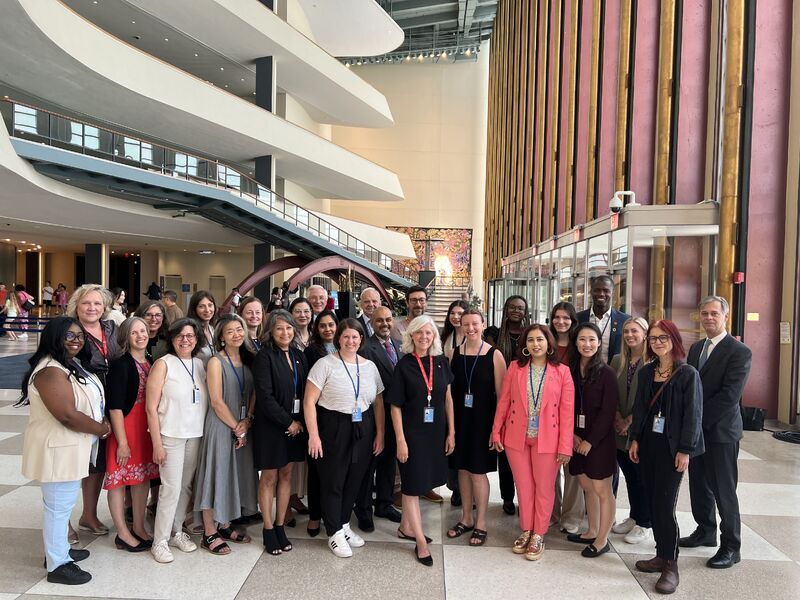
It is not easy to talk about SDGs in today’s world. With growing disparity, inequities, militarization, genocide, raging climate change, hunger and increasing violence, including gender-based violence, the prospects of achieving the SDGs and the ultimate goal of global sustainable, equitable development for all people and planet, seem remote. We were reminded repeatedly that we are halfway to the end date of 2030 and only 16 percent of the SDG targets have been achieved.
SDG 16 – peace, justice and strong institutions, which was one of the goals highlighted in this forum, was described as “a condition, enabler and catalyst” for other SDGs. Yet, this goal is backsliding, and, in some areas, targets have never been worse. In a world where civilian deaths have increased 72 percent, where military spending has surged, where impunity has increased and justice institutions, including the UN, are being undermined, the situation is bleak.
At the same time, the forum was an opportunity to underscore the urgency for action and for bold structural and transformative change to move the goals forward. We heard this call to action from UN speakers, some states and civil society organizations.
In this year’s report on the SDGs, António Guterres, United Nations Secretary-General emphasized this urgency: “Unless we act now, the 2030 Agenda will become an epitaph for a world that might have been.”
In the opening ceremony of ministerial segment of the Forum, at the General Assembly, this message of urgency was loud and clear. The president of the General Assembly, Dennis Francis, began his remarks with, “it is up to us to deliver and deliver we must…A high sense of urgency is the strongest motivation we have.”
He spoke of the need for a more equitable financial structure that addresses the debt crisis. He called on states to be bold, warning them, “we cannot be numb to the glaring facts and figures.”
Deputy General Secretary of the UN, Amina Mohammed, echoed this pressing demand, “At last year’s summit I called for a rescue package. Today, I call member states to move to action – the most urgent and ambitious acceleration in forty years.”
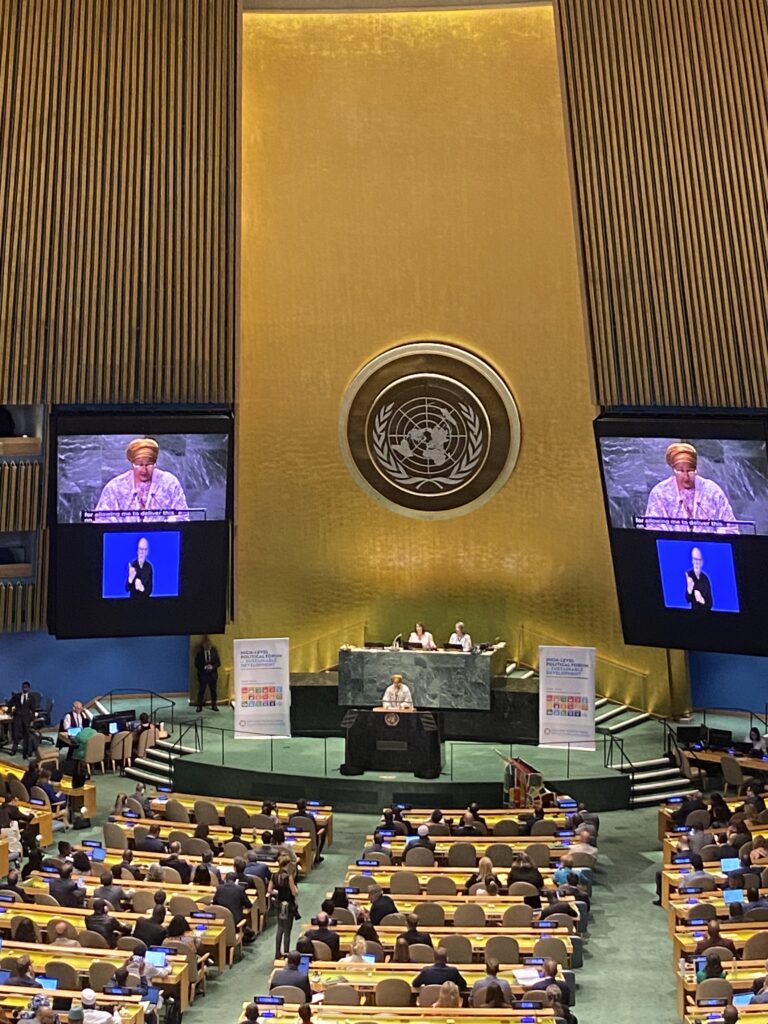
Michelle Bachelet, former UN High Commissioner for Human Rights (from 2018 to 2022) addressed “the crisis of hope” in which we are living. She said that we have the data, the knowledge, and institutions. She argued that change is underway in communities, social movements, and civil society organizations, but it is not all visible and reflected in the 16 percent success rate. She appealed to us to amplify solidarity and political and financial cooperation to support this hope.
And, there were pockets of hope. Throughout the forum, speakers from civil society, the UN and some states reminded each other as a global community of the urgency for action, the primacy of human rights, the need to ensure that perpetrators are brought to justice, to divest from militarization and invest in SDGs, and to centre the voices of those most affected by violence and injustice – women, youth, Indigenous peoples and human rights defenders – in the discussion. For me, this was inspiring and a clear reminder of why I do this work.
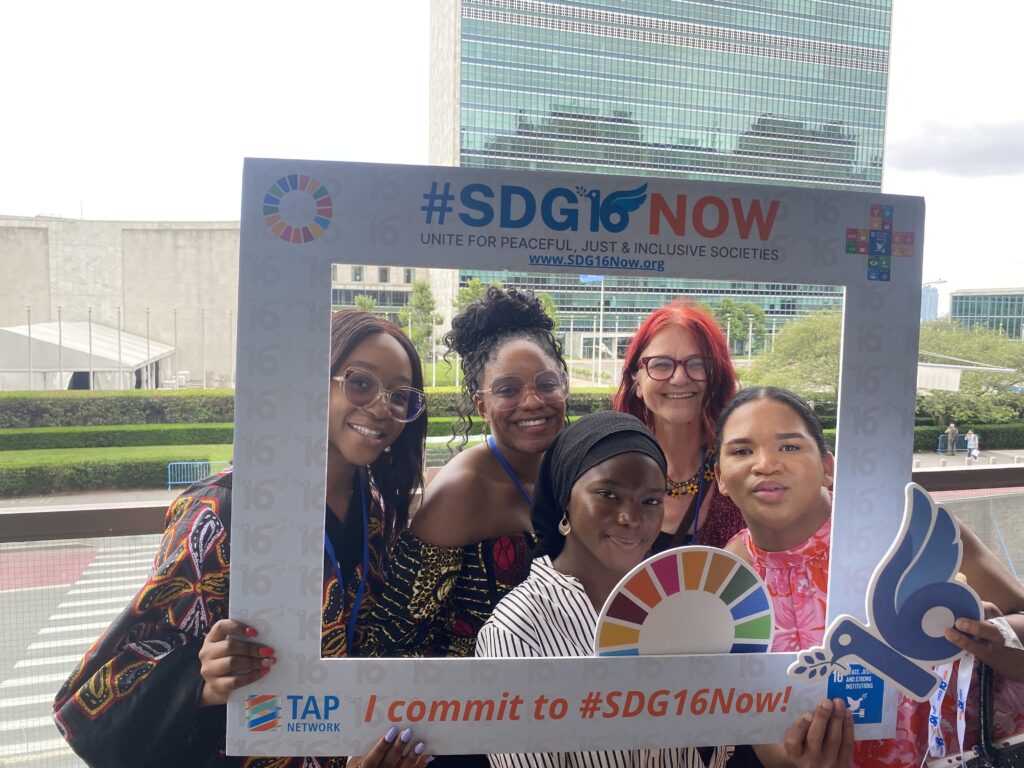
The messages of hope and inspiration could be found in the interventions of some states, the side events, and strategizing sessions. I have referenced some of these inspiring speakers and messages here to convey both the urgency and hope.
- In the official session on SDG16 -peace, justice and institutions, there was an incredibly moving intervention by the representative from Palestine which was received with several minutes of loud applause. Later, Ireland dedicated their three minutes to women in Gaza.
- Colombia spoke about “la paz con la naturaleza” (peace with nature) and the importance of women and Indigenous peoples in defining and building this peace.
- In a side event on Gender, Climate and Peace and Security, the chair introduced the panel with, “there is no better time to have this conversation.” In the discussion that followed, the speaker from UN Women noted that women are drivers in the change. Her message was clear, “We know that when we support women, we have a better change. Women are already living these solutions. They just need support (political and financial) and assurance in all spaces of decision-making.”
- In the strategizing session, Mobilizing for Urgent Action on Peace, Justice and Inclusion, we learned about the important work of the Transparency, Accountability and Participation (TAP) Network and the SDG16 Now Campaign. There is an opportunity for KAIROS to join this campaign. John Romano, Director of the TAP network noted that SDG16 is relatively new as an SDG goal (15 years), but this work on peacebuilding and justice is not new. Civil society has been working on these issues for decades and has recognized that it was an enabler and catalyst for sustainable development. He stressed the importance of recognizing the diversity of civil society and key role of youth who represent 60 percent of the population affected in fragile conflict affected regions. TAP has developed a toolkit which seeks to support, advocate for and make visible this work by identifying allies and champions and sharing stories of change.
- In another excellent event on Feminist Climate Action, I learned about the Feminist Action for Climate Justice – Action Coalition and met several people and organizations who are working on climate, peace and gender. There is more recognition of this nexus. Women’s International League for Peace and Freedom (WILPF) led a session on Feminist Climate Action and Peacebuilding. The message was clear – climate change is a driver of insecurity and militarization is harming the environment; and, therefore, demilitarization has impacts for peace and the environment. A feminist approach is critical because women are key protagonists in the struggles for peace, demilitarization and climate and environmental justice.
- Canada’s side event – Addressing Poverty means Caring for Everyone: Why We Need to Pay Attention to the Care Economy was also a highlight where we heard from incredibly inspiring speakers. Ido Peng spoke about the importance of merging the care economy and climate change impacts and how these differentially impact people: “We need to expand our concept of care beyond human centred care – interspecies and interdependence of care are so necessary to advance SDGs.” Armine Yalnizyan noted that the list of successes in the care economy are the same as those that are being underfunded and at risk. Even as need is increasing, we are seeing underfunding. She urged us to recognize the economic significance of the care economy (13.5 percent of GDP and 21 percent of jobs), follow the money and keep it public. In her concluding remarks, she offered the following hopeful message, “The future could be caring. It could be less about growth and more about well-being.”
Another highlight and source of hope for me was the affirmation that the work that KAIROS is doing with partners, both globally and in Canada, is clearly addressing and advancing SDGs. Although partners do not necessarily frame their priorities and outcomes in terms of “SDG goals and targets,” they most definitely are. There were so many examples of this.
The work of our Women of Courage: Women, Peace and Security partners so clearly resonates with the discussion on SDG 16 – peace, justice and strong institutions – as a condition, enabler, catalyst and accelerator for all other SDGs, with women as key participants and protagonists. The discussions on the interlinkage of SDG 16 (peacebuilding) and SDG 13 (climate change) with women and those most impacted as critical drivers in this work, also reverberates with the work of global partners, who talk about the nexus of conflict, climate, and gender.
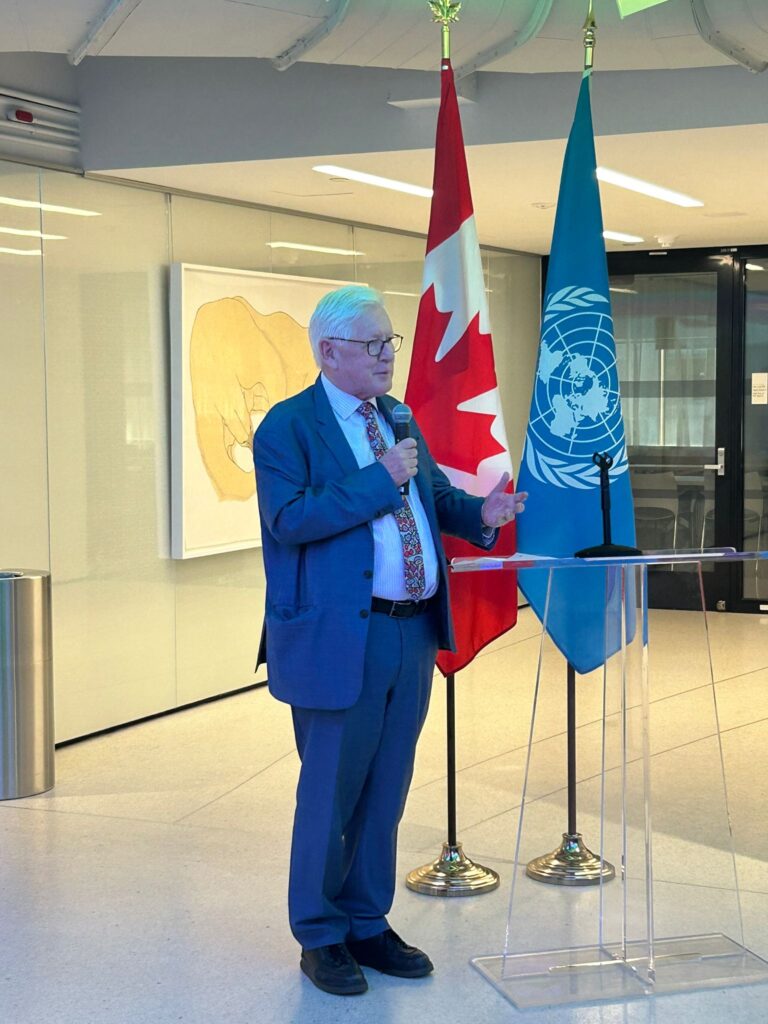
The discussions on the care economy and Canada’s side event on this topic also resonated with our work at KAIROS as partners are clearly contributing to the care economy in Canada and globally. In Canada, we are working with community partners on migrant justice, ecological justice, Indigenous rights, just transition and related advocacy. Globally, we work with partners on women’s economic empowerment, sustainable peacebuilding, environmental protection, and climate adaptation, and on related advocacy, including strengthening an enabling environment for human rights and environmental rights defenders. The discussion on the merging of the care economy and climate change was also very interesting and coincides with the work we are doing on just transition in Canada as well our work with global women peacebuilders, economic empowerment, and climate change. For me, participation in the Canadian delegation and the HLPF SDG, affirmed and reinforced that KAIROS and partners are working on the SDGs in Canada and globally. I realized that KAIROS could play an important role in this cross-cutting and intersectional work on SDGs, in linking SDGs and ensuring they are universally applied. As KAIROS, we are in a privileged position of working with partners in Canada and globally. We can link this work. Partners may not be describing their work in terms of SDG goals and targets, and they don’t need to, but they are such powerful drivers in achieving SDGs. By supporting these partners in Canada and globally and facilitating linkages between their work, we are part of the action that is so urgently needed for effective, transformative, and sustainable change that is led by those who are most impacted, and that “leaves no one behind.” This gives me hope.
Rachel Warden is KAIROS’ Partnerships Manager
